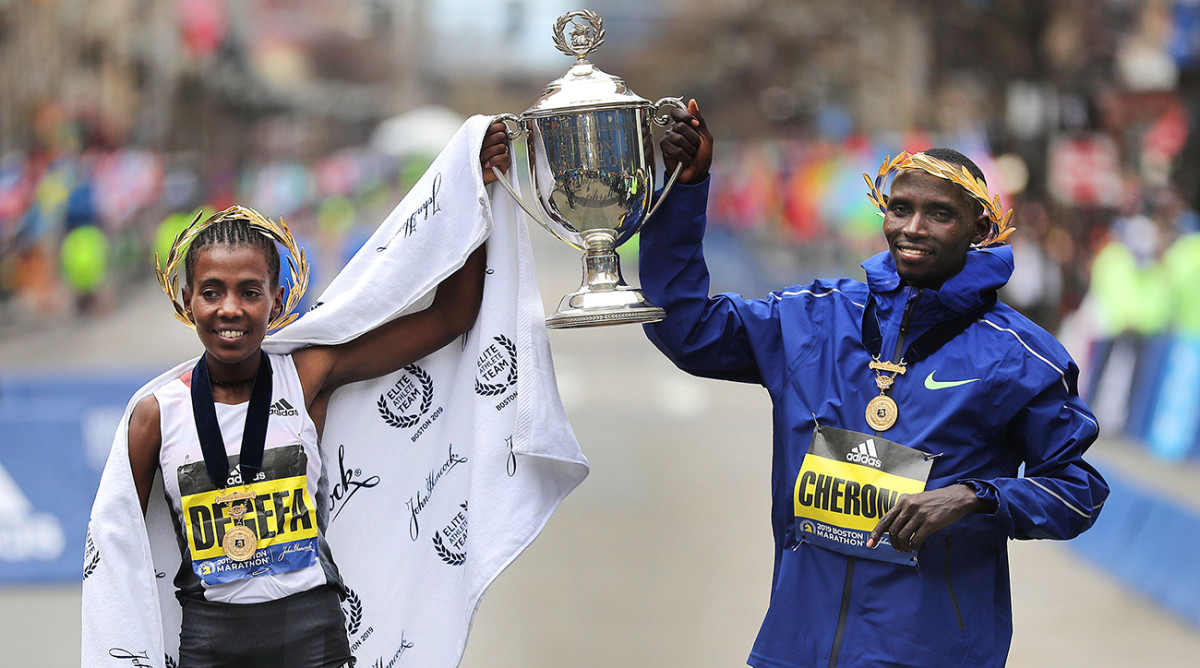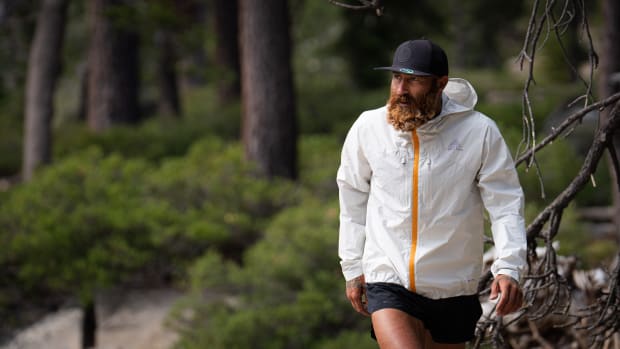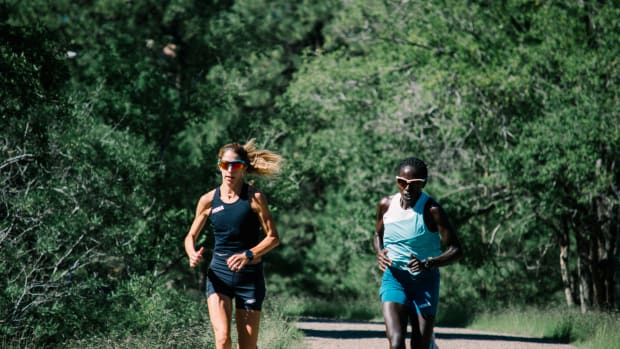Ethiopia’s Worknesh Degefa, Kenya's Lawrence Cherono Win 2019 Boston Marathon

BOSTON – Ethiopia’s Worknesh Degefa pulled away from the field of elite women after five miles and ran the remainder of the race alone for a comfortable victory at the Boston Marathon on Monday. On the men’s side, it was the complete opposite: Kenya’s Lawrence Cherono left it to a sprint finish over past champion Lelisa Desisa to decide his win.
Making her Abbott World Marathon Majors debut, Degefa backed up her credentials as the Ethiopian marathon record holder and fourth-fastest woman of all-time by running 2:23:31. Meanwhile, Cherono notched his first major victory in his Boston debut by edging out two-time champion Desisa in the final 50 meters, finishing in 2:07:57 to Desisa’s 2:07:59.
Here are some quick takeaways from the 2019 Boston Marathon:
Women’s race had much less drama
Before the race, 2018 champion Des Linden says she looked around and saw fellow competitors keeping their jackets on while warming up and heading to the starting line as a way of over preparing, given last year’s windy and rainy maelstrom. But the skies cleared and there was much less excitement and drama than last year’s drought-ending victory from Linden. She and fellow American Sarah Hall led the early miles before Degefa decided to make her move with a 5:17 fifth mile. By the time she hit the 20K mark in 1:06:59, no other competitor could be seen. Her biggest lead of the day came at 30K when she was two minutes and 59 seconds ahead of the chase pack of East Africans and Jordan Hasay, the second-fastest American marathoner of all-time.
Heartbreak Hill appeared to take its toll on Degefa, as she slowed down at Mile 21. In hopes of reeling in the leader, Kenya’s Edna Kiplagat employed a similar strategy that won her the 2017 title: accelerating after the hills. Kiplagat was able to make the final turn onto Boylston Street with Degefa in her sights, but she did not have enough road left to catch her. Degefa held on for the win by 42 seconds. Kiplagat, who will turn 40 in November, recorded her ninth podium finish at a World Marathon Major on Monday.
Jordan Hasay: Back Like She Never Left
In 2017, Jordan Hasay made her marathon debut with a third place, 2:23:00 finish that made her the fastest American debutant at the distance. She improved on that time at the Chicago Marathon with a third place finish in 2:20:57 to become the second-fastest American woman at the distance. Her 2018 campaign was marred by injury after she was forced to withdraw from Boston due to a stress reaction in her heel. But Hasay reported that she was fully healthy heading into Monday’s race. While the humidity didn’t result in a faster performance, she re-established her place atop U.S. women’s marathoning with a third place finish in 2:25:20.
In her three career marathons, Hasay has finished third—that’s a good sign for the 2020 U.S. Olympic Marathon Trials, where only a top three finish guarantees a spot at the 2020 Olympics in Tokyo. While some elite runners will plan to skip the fall marathon season in preparation for the trials, Hasay plans to run the Chicago Marathon to attempt to break Deena Kastor’s American record of 2:19:36.
Des Linden Was Just Trying Not To Puke
Des Linden was emotional as she approached the finish line and blew kisses to the fans in the stands, but it wasn’t because her year as the reigning Boston Marathon champion was coming to an end. In the post-race press conference, Linden told reporters that she was just trying not to throw up before crossing the finish line.
“I’m going to be totally honest with you,” Linden says. “That was me almost vomiting.”
She struggled with fueling and glycogen issues throughout the race, but still managed to finish fifth overall in 2:27:00.
With a fifth place finish, Linden has now won and finished second, fourth and fifth in her Boston career.
“I’d love a third just to get the set," Linden says. "I think that would look good on my desk. I think this course was built for me. Whatever the weather and whatever the competitors, I’m always going to come out and represent myself well. When I do decide to walk away, this will feel like my home course.”
Desisa Tries to Make Marathoning Into A Contact Sport
After making the right turn onto Hereford Street on Monday, Desisa put himself in front of the Kenyan pair of Cherono and Kenneth Kipkemoi and attempted to hold on for the final left turn toward the finish. As Cherono pulled up on his right side, Desisa extended his right arm to attempt a block. Cherono wasn’t fazed, made the pass and held on for the two-second victory.
The finish is tied for the third-closest race in history. In 2000, there was a similar Kenyan and Ethiopian duel between Elijah Lagat and Gezahegne Abera, where both men finished in 2:09:47. The elbowing stirred up some memories as well: at the 2014 New York City Marathon, Lelisa Desisa threw an elbow at former world record holder Wilson Kipsang, who stared down the Ethiopian star and then dropped Desisa with just 400 meters remaining.
Scott Fauble and Jared Ward are 2020 U.S. Olympic Contenders
2016 U.S. Olympian Jared Ward was the top American at last fall’s New York City Marathon (2:12:24) with Fauble finishing just four second behind him. After that race, both men faced questions and criticism about the state of U.S. men’s marathoning and the lack of a sub-2:10 marathon for the Americans. They both hit back with statement performances on Boston’s course.
Fauble and Ward fearlessly found themselves in front of men with multiple Abbott World Marathon Major victories on their resumes and personal bests in the 2:04-range. Ward led at 20K and then Fauble found himself in front at 30K. The East African contingent led by Cherono, Desisa and Kipkemoi dropped Fauble by 40K, but the former Portland Pilot standout held on for a seventh place finish in 2:09:09. Ward ended up just behind him by 16 seconds for eighth place.
“Whatever time the media wanted to put as the barrier that’s the fastest that American men are running is pretty arbitrary," Fauble says. "You could’ve said 2:08:43 or whatever. We have done at very well at competing at top marathons. Some days that means running 2:09. Sometimes at New York, that means running 2:12. I’ve never felt pressure to rip a marathon or chase a fast time because of something you guys say.”
While the times meet the 2:11:30 standard set by the International Association of Athletics to compete at the 2020 Olympics, they can not be used to qualify because of the Boston course’s downhill and point-to-point nature. However, because Boston is a major marathon, a top 10 finish also secures an Olympic standard. Fauble and Ward are now eligible to compete at the Olympics, if they finish in the top three at the 2020 U.S. Olympic Marathon Trials next February.
“When we’re on the start line, we think we’re sub-2:10 guys," Ward says. "We just needed the right race for this to come together. Today it came together for Scott and I. In the fall, maybe it comes together for someone else. The talent is there. It’s not only about being patient as a marathon runner but being patient for the race where that time comes.”
Before Monday, the last time two American men broke 2:10 at the Boston Marathon was 2010's fifth and sixth place finish by Ryan Hall (2:08:41) and Meb Keflezighi (2:09:26).
BONUS: Inside A Marathon...Again
After Fauble's seventh place finish at last year's New York City Marathon, he and his coach Ben Rosario decided to publish a book titled "Inside a Marathon" that detailed the training that led to that result. Rosario and Fauble followed a very similar and calculated approach to the Boston Marathon. A few tweaks were made for Fauble to focus on marathon-specific training efforts by backing off some mid-week workouts to focus on "enormous" weekend runs.
Accomplished Japanese coach Katsuhiko Hanada visited Flagstaff, Arizona and reviewed notes with Rosario. During some workouts, he'd point to the screen and say, "Too hard" or "Make this easier" or "Make this harder." Rosario tested the minor suggestions. With a lot more of the same training, Fauble was just stronger and more mature as a marathoner in his third shot at the distance.
"He's now in the upper eschelon – not only Americans," Rosario says. "The guy just got seventh in New York City and then seventh in Boston. He's one of the world's best marathoners in these types of races."
Among the workouts that stand out to Rosario from the most recent training block is a 16-miler with three weeks to go at Sunset Crater, which is located just 40 minutes north of Flagstaff. Rosario describes the course as harder than Boston with downhills that are more dynamic and tougher uphill climbs. The run flattens out for the final four miles, where Fauble split 5:01, 4:53, 4:49 and 4:44.
"When he got done, he didn't realize that he had been running into the 4:40s," Rosario says. "He was just in the zone and it was all coming naturally to him. To average 5:03 pace on that at 5,500 feet with 6:08 uphill mile in there, I thought, 'Oh man. This guy is going to absolutely crush.' From there, I was pretty sure that it was going to go pretty well."





